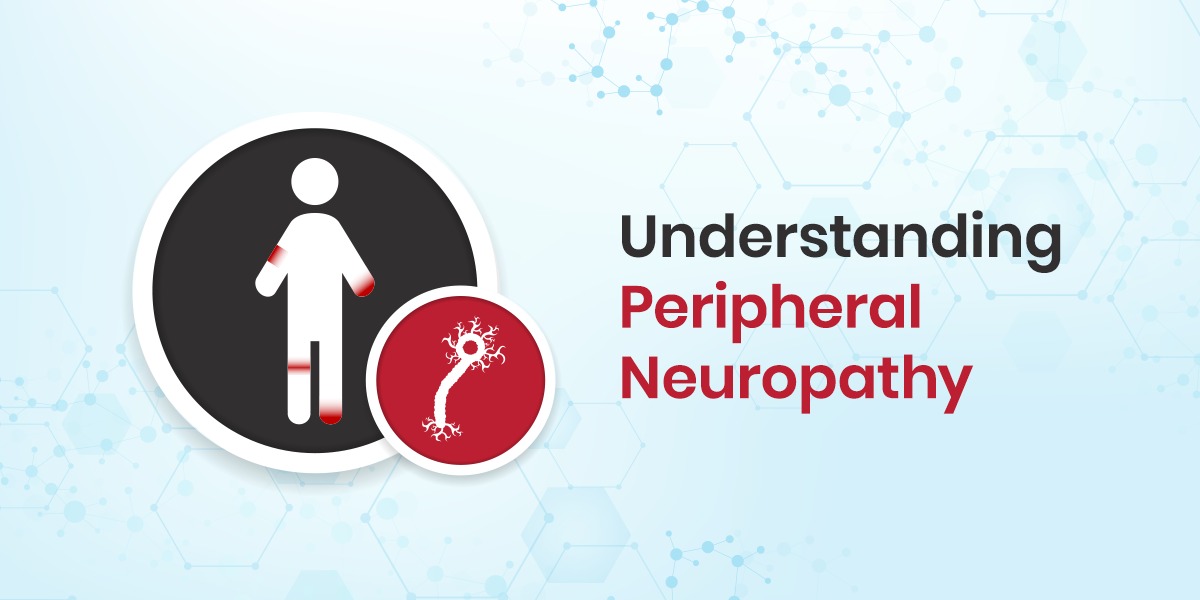What is Peripheral Neuropathy? Symptoms, Causes, and Management

Have you ever felt a continuous tingling or numbness in your hands or feet that just doesn’t go away? These could be early warning signs of a condition known as Peripheral Neuropathy. It’s a disorder that affects the network of nerves known as the peripheral nerves. These are the nerves that connect your brain and spinal cord to the rest of your body.
Peripheral neuropathy is more common than many people think. This can result from a wide variety of causes, ranging from diabetes to vitamin deficiencies. Its symptoms can range from mild discomfort to severe pain and disability.
Let’s learn what is peripheral neuropathy, its causes, common symptoms, and how it can be treated and managed.
What is Peripheral Neuropathy?
Peripheral neuropathy refers to damage or dysfunction of the peripheral nerves. These nerves branch out from the central nervous system to the rest of the body, including your arms, legs, hands, feet, internal organs, and even the skin. The peripheral nervous system is responsible for:
- Sensory functions include feeling temperature, pain, or touch.
- Motor functions like muscle functions.
- Autonomic functions include heartbeat and digestion.
Common Symptoms of Peripheral Neuropathy
Peripheral neuropathy symptoms can range from mild to severe and often develop gradually. Here are some common symptoms:
Tingling or Numbness
Tingling in the hands or feet is one of the earliest signs of peripheral neuropathy. It is often described as “pins and needles” and may start in the toes or fingers and spread upward.
Burning or Sharp Pain
Some people may experience shooting or stabbing pains, especially at night. This pain can be persistent and disrupt sleep and quality of life.
Muscle Weakness
Damage to motor nerves can lead to muscle weakness, coordination problems, or even paralysis in severe cases.
Sensitivity to Touch
Even a light touch, such as a cloth brushing against your skin, may become unbearable.
Loss of Balance and Coordination
Nerve damage can also impact your sense of body position. This can make it difficult to walk or maintain a balance, especially in the dark.
Autonomic Symptoms
If autonomic nerves are affected, it can lead to symptoms such as digestive issues, dizziness upon standing, heat intolerance, or abnormal sweating.
Causes of Peripheral Neuropathy
Peripheral neuropathy could be a symptom of various underlying conditions. Here are some peripheral neuropathy causes.
Diabetes
Diabetic neuropathy is the most common form. It is caused by prolonged high blood sugar levels that damage nerves over time.
Infections
Certain infections, such as shingles, Lyme disease, hepatitis C, and HIV, can lead to nerve damage.
Autoimmune Diseases
Conditions like lupus, rheumatoid arthritis, and Guillain-Barré Syndrome can cause the immune system to attack the healthy nervous system.
Vitamin Deficiencies
A lack of vitamins, especially B12, B6, and E, can affect nerve health and functioning.
Alcoholism
Chronic alcoholism can lead to nutritional deficiencies and toxic nerve damage.
Exposure to Toxins
Exposure to certain chemicals and heavy metals can also cause peripheral nerve damage.
Genetic Disorders
Some forms of genetic disorders are inherited.
Trauma or Injury
Physical injury from accidents, repetitive stress, or surgeries can damage peripheral nerves.
Diagnosing Peripheral Neuropathy
Diagnosing peripheral neuropathy typically involves a combination of:
- Medical history and physical exam.
- Neurological test to assess muscle strength, reflexes, and coordination.
- Blood test to detect diabetes, vitamin deficiency, or an immune disorder.
- Electromyography (EMG) and nerve conduction studies.
- Nerve biopsy in some rare cases.
Managing Peripheral Neuropathy
While some peripheral neuropathy can be reversed if the underlying cause is treated. Others may require long-term management.
Addressing the Underlying Cause
Here, the underlying conditions such as diabetes, infections, or autoimmune disease are managed. This helps to slow down or stop nerve damage.
Medications
Medications such as pain relievers, antidepressants, anti-seizure drugs, or topical treatments are used to alleviate the pain.
Lifestyle Changes
Lifestyle changes like a healthy diet, regular exercise, foot care, and avoiding alcohol and smoking are recommended.
Physical Therapy
Strengthening exercises, balance training, and stretching can improve mobility and reduce pain.
Alternative Therapies
Some people might find relief through acupuncture or massage therapy. Although these cannot replace medical treatments.
Conclusion
Peripheral neuropathy is a complex condition that has a wide range of symptoms and causes. Whether it’s a tingling sensation in the feet or muscle weakening in the hands, these signs shouldn’t be ignored. Understanding the condition can help start getting effective management. With proper care, medication, and lifestyle changes, people can lead active lives.
Don’t wait when it comes to neurological health. Visit Regency Healthcare and connect with the best neurologist in Gorakhpur.
Also Read: Neurologist vs Neurosurgeon: Key Differences, Roles & When to Consult

 Call-an-Ambulance
Call-an-Ambulance



